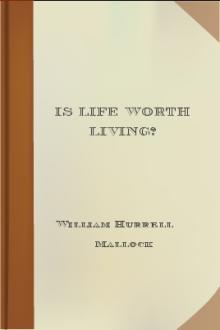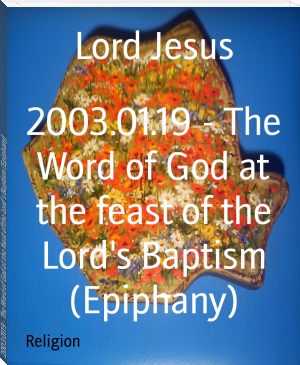Is Life Worth Living? by William Hurrell Mallock (best ereader for textbooks TXT) 📕

- Author: William Hurrell Mallock
- Performer: -
Book online «Is Life Worth Living? by William Hurrell Mallock (best ereader for textbooks TXT) 📕». Author William Hurrell Mallock
As a pioneer, and not as a preacher, I have tried to indicate the real position in which modern knowledge has placed us, and the way in which it puts the problem of life before us. I have tried to show that, whatever ultimately its tendency may prove to be, it cannot be the tendency that, by the school that has given it to us, it is supposed to have been; and that it either does a great deal more than that school thinks it does, or a great deal less. History would teach us this, even if nothing else did. The school in question has proceeded from denial to denial, thinking at each successive moment that it had reached its final halting-place, and had struck at last on a solid and firm foundation. First, it denied the Church to assert the Bible; then it denied the Bible to assert God; then it denied God to assert the moral dignity of man: and there, if it could remain, it would. But what it would do is of no avail. It is not its own master; it is compelled to move onwards; and now, under the force of its own relentless logic, this last resting-place is beginning to fail also. It professed to compensate for its denials of God's existence by a freer and more convincing re-assertion of man's dignity. But the principles which obliged it to deny the first belief are found to be even more fatal to the substitute. 'Unless I have seen with my eyes I will not believe,' expresses a certain mental tendency that has always had existence. But till Science and its positive methods began to dawn on the world, this tendency was vague and wavering. Positive Science supplied it with solid nutriment. Its body grew denser; its shape more and more definite; and now the completed portent is spreading its denials through the whole universe. So far as spirit goes and spiritual aspirations, it has left existence empty, swept and garnished. If spirit is to enter in again and dwell there, we must seek by other methods for it. Modern thought has not created a new doubt; it has simply made perfect an old one; and has advanced it from the distant regions of theory into the very middle of our hearts and lives. It has made the question of belief or of unbelief the supreme practical question for us. It has forced us to stake everything on the cast of a single die. What are we? Have we been hitherto deceived in ourselves, or have we not? And is every hope that has hitherto nerved our lives, melting at last away from us, utterly and for ever? Or are we indeed what we have been taught to think we are? Have we indeed some aims that we may still call high and holy—still some aims that are more than transitory? And have we still some right to that reverence that we have learnt to cherish for ourselves?
Here lie the difficulties. The battle is to be fought here—here at the very threshold—at the entrance to the spiritual world. Are we moral and spiritual beings, or are we not? That is the decisive question, which we must say our Yes or No to. If, with our eyes open, and with all our hearts, it be given us to say Yes—to say Yes without fear, and firmly, and in the face of everything—then there will be little more to fear. We shall have fought the good fight, we shall have kept the faith; and whatever we lack more, will without doubt be added to us. From this belief in ourselves we shall pass to the belief in God, as its only rational basis and its only emotional completion; and, perhaps, from a belief in God, to a recognition of His audible voice amongst us. But at any rate, whatever after-difficulties beset us, they will not be new difficulties; only those we had braved at first, showing themselves more clearly.
But that first decision—how shall we make it? Who or what shall help us, or give us counsel? There is no evidence that can do so in the sensible world around us. The universe, as positive thought approaches it, is blind and dumb about it. Science and history are sullen, and blind, and dumb. They await upon our decision before they will utter a single word to us: and that decision, if we have a will at all, it lies with our own will—with our will alone, to make. It may, indeed, be said that the will has to create itself by an initial exercise of itself, in an assent to its own existence. If it can do this, one set of obstacles is surmounted; but others yet confront us. The world into which the moral will has borne itself—not a material world, but a spiritual—a world which the will's existence alone makes possible, this world is not silent, like the other, but it is torn and divided against itself, and is resonant with unending contradictions. Its first aspect is that of a place of torture, a hell of the intellect, in which reason is to be racked for ever by a tribe of sphinx-like monsters, themselves despairing. Good and evil inhabit there, confronting each other, for ever unreconciled: there is omnipotent power baffled, and omnipotent mercy unexercised. Is the will strong enough to hold on through this baffling and monstrous world, and not to shrink back and bid the vision vanish? Can we still resolve to say, 'I believe, although it is impossible'? Is the will to assert our own moral nature—our own birthright in eternity, strong enough to bear us on?
The trial is a hard one, and whilst we doubt and hesitate under it the universal silence of the vast physical world itself disheartens us. Who are we, in the midst of this unheeding universe, that we can claim for ourselves so supreme a heritage; that we can assert for ourselves other laws than those which seem to be all-pervading, and that we can dream of breaking through them into a something else beyond?
And yet it may be that faith will succeed and conquer sight—that the preciousness of the treasure we cling to will nerve us with enough strength to retain it. It may be that man, having seen the way that, unaided, he is forced to go, will change his attitude; that, finding only weakness in pride, he will seek for strength in humility, and will again learn to say, 'I believe, although I never can comprehend.' Once let him say this, his path will again grow clearer for him. Through confusion, and doubt, and darkness, the brightness of God's countenance will again be visible; and by-and-by again he may hear the Word calling him. From his first assent to his own moral nature he must rise to a theism, and he may rise to the recognition of a Church—to a visible embodiment of that moral nature of his, as directed and joined to its one aim and end—to its delight, and its desire, and its completion. Then he will see all that is high and holy taking a distinct and helping form for him. Grace and mercy will come to him through set and certain channels. His nature will be redeemed visibly from its weakness and from its littleness—redeemed, not in dreams or in fancy, but in fact. God Himself will be his brother and his father; he will be near akin to the Power that is always, and is everywhere. His love of virtue will be no longer a mere taste of his own: it will be the discernment and taking to himself of the eternal strength and of the eternal treasure; and, whatever he most reveres in mother, or wife, or sister—this he will know is holy, everywhere and for ever, and is exalted high over all things in one of like nature with theirs, the Mother of grace, the Parent of sweet clemency, who will protect him from the enemy, and save him in the hour of death.
Such is the conception of himself, and of his place in existence, that, always implicit in man, man has at last developed. He has at last conceived his race—the faithful of it—as the bride of God. Is this majestic conception a true one, or is it a dream only, with no abiding substance? Is it merely a misty vision rising up like an exhalation from the earth, or does a something more come down to it out of heaven, and strike into it substance and reality? This figure of human dreams has grown and grown in stature: does anything divine descend to it, and so much as touch its lips or its lifted hands? If so, it is but the work of a moment. The contact is complete. Life, and truth, and force, like an electric current, pass into the whole frame. It lives, it moves, it breathes: it has a body and a being: the divine and the eternal is indeed dwelling amongst us. And thus, though mature knowledge may seem, as it still widens, to deepen the night around us; though the universe yawn wider on all sides of us, in vaster depths, in more unfathomable, soulless gulfs; though the roar of the loom of time grow more audible and more deafening in our ears—yet through the night and through the darkness the divine light of our lives will only burn the clearer: and this speck of a world as it moves through the blank immensity will bear the light of all the worlds upon its bosom.
Thinkers like Mr. Leslie Stephen say that such beliefs as these belong to dreamland; and they are welcome if they please to keep their names. Their terminology at least has this merit, that it recognises the dualism of the two orders of things it deals with. Let them keep their names if they will; and in their language the case amounts to this—that it is only for the sake of the dreams that visit it that the world of reality has any certain value for us. Will not the dreams continue, when the reality has passed away?
G. P. PUTNAM'S SONS have in preparation a series of volumes, to be issued under the title of
CURRENT DISCUSSION, A COLLECTION FROM THE CHIEF ENGLISH ESSAYS ON QUESTIONS OF THE TIME.The series will be edited by Edward L. Burlingame, and is designed to bring together, for the convenience of readers and for a lasting place in the library, those important and representative papers from recent English periodicals, which may fairly be said to form the best history of the thought and investigation of the last few years. It is characteristic of recent thought and science, that a much larger proportion than ever before of their most important work has appeared in the form of contributions to reviews and magazines; the thinkers of the day submitting their results at once to the great public, which is easiest reached in this way,





Comments (0)